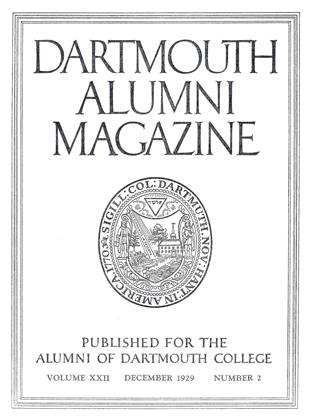The tragic death of George Hannauer, president of the Boston and Maine Railroad, on November 2 was a blow to all New England. He was stricken with angina pectoris at the Yale-Dartmouth game in New Haven and passed away shortly afterward. He had come to be an admirer of Dartmouth and a good friend of the College. As a member of the board of directors of the Boston and Maine and as a close personal friend, President Hopkins was asked to deliver the eulogy at the funeral services held in Boston, November 5. The appreciation delivered by President Hopkins in Mr. Hannauer's memory follows:
Words are but feeble things at a time like this and it is not for utterance of them that I have accepted the privilege of appearance here today. I come rather to symbolize those deep and intimate sentiments which men feel but to which any adequate expression is denied.
Today, thousands of men associated with & great industrial organization grieve for a lost leader. To them he had given new basis for pride in their work, new assurance of the importance of the enterprise to which they make their contribution, new zest for accomplishment of the task in hand.
Today, the host of those who make up the constituency served by a great public utility mourn the loss of a sympathetic friend who understood their need and worked unceasingly in their behalf.
There is a myth of the superman in human affairs but the world's work is done and life is made orderly and sweet by men of understanding mind and indefatigable industry and good will toward their fellows. Such men are few but the man to whose memory we pay tribute today was numbered among them. He was a man whose opinion was received with respect, whose cooperation one held to be a boon, whose friendship one held to be a priceless possession.
The description might well have been written of Mm which Marcus Aurelius wrote, analyzing the qualities of men of highest usefulness, wherein he said,
"One man, when he has done a service to another, is ready to set it down to his account as a favor conferred. Another is not ready to do this, but still in his own mind he thinks of the man as his debtor and he knows what he has done. A third in a manner does not even know what he has done, but he is like a vine which has produced grapes, and seeks for nothing more after it has once produced its proper fruit. As a horse when he has run, a dog when he has tackled the game, a bee when it has made the honey, so a man when he has done a good act does not call out for others to come and see but he goes on to another act, as a vine goes on to produce again the grapes in season."
Less than three years ago, George Han- nauer brought to New England the high at- tributes of character, the wealth of experience and the winning personality so vitally needed for the development of a great railroad sys- tem, whose successful operation was indis- pensable to its four northern states. Speedily he won the confidence, respect, and affection of those with whom he came into contact; thoroughly he mastered his problem; prodigally he gave of his strength.
I know of no field of human endeavor wherein it is possible for "virtue to turn vice, being misapplied" more definitely than in the administration of a great public utility. Development of the needful relationships of one loyalty and another to the various obligations which are imposed demand high intelligence, clarity of purpose and rigidity of character. These were the qualities of him whom we hold in grateful remembrance.
This service which we attend in token of our sense of loss for one who has become dear to us is no final testimonial. His works will follow him through succeeding years when policies which he devised and improvements which he inaugurated approach fulfillment. Tribute will continue, appreciation of the man he was will grow, affection will remain. And so now while we take our last leave of the earthly tabernacle in which abided a great heart and a gentle soul, his spirit lives and his accomplishments endure.
 View Full Issue
View Full Issue
More From This Issue
-
 Class Notes
Class NotesCLASS OF 1923
December 1929 By Truman T. Metzel -
 Article
ArticleAlumni Associations
December 1929 -
 Article
ArticleAlumni Council Meets in New York
December 1929 -
 Article
ArticleCarnegie Report
December 1929 -
 Article
ArticleThe Dartmouth Indians
December 1929 By Eric P. Kelly -
 Sports
SportsThe Yale Epic
December 1929 By Phil Sherman
Article
-
 Article
ArticleThe ALUMNI MAGAZINE follows the custom of its esteemed contemporaries
July 1920 -
 Article
ArticleInvestigate Publications
November 1937 -
 Article
ArticleConnecticut Celebration
APRIL 1969 -
 Article
ArticleDan'l Adams, 1797
March 1950 By DAVID E. ADAMS '13 -
 Article
ArticleClass of 1975
Jan/Feb 2005 By Jim Bildner '75 -
 Article
ArticleCheck your Local Listings
APRIL 1989 By R.H.N


